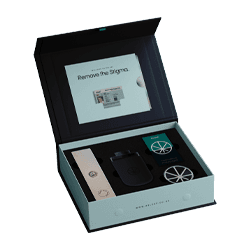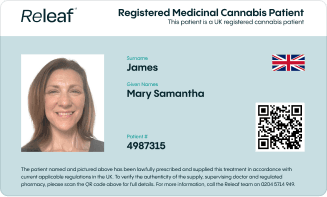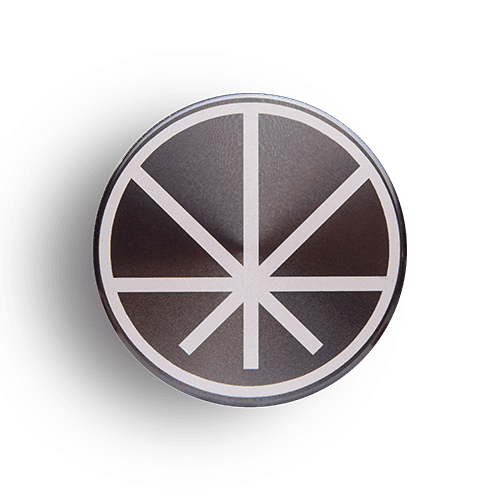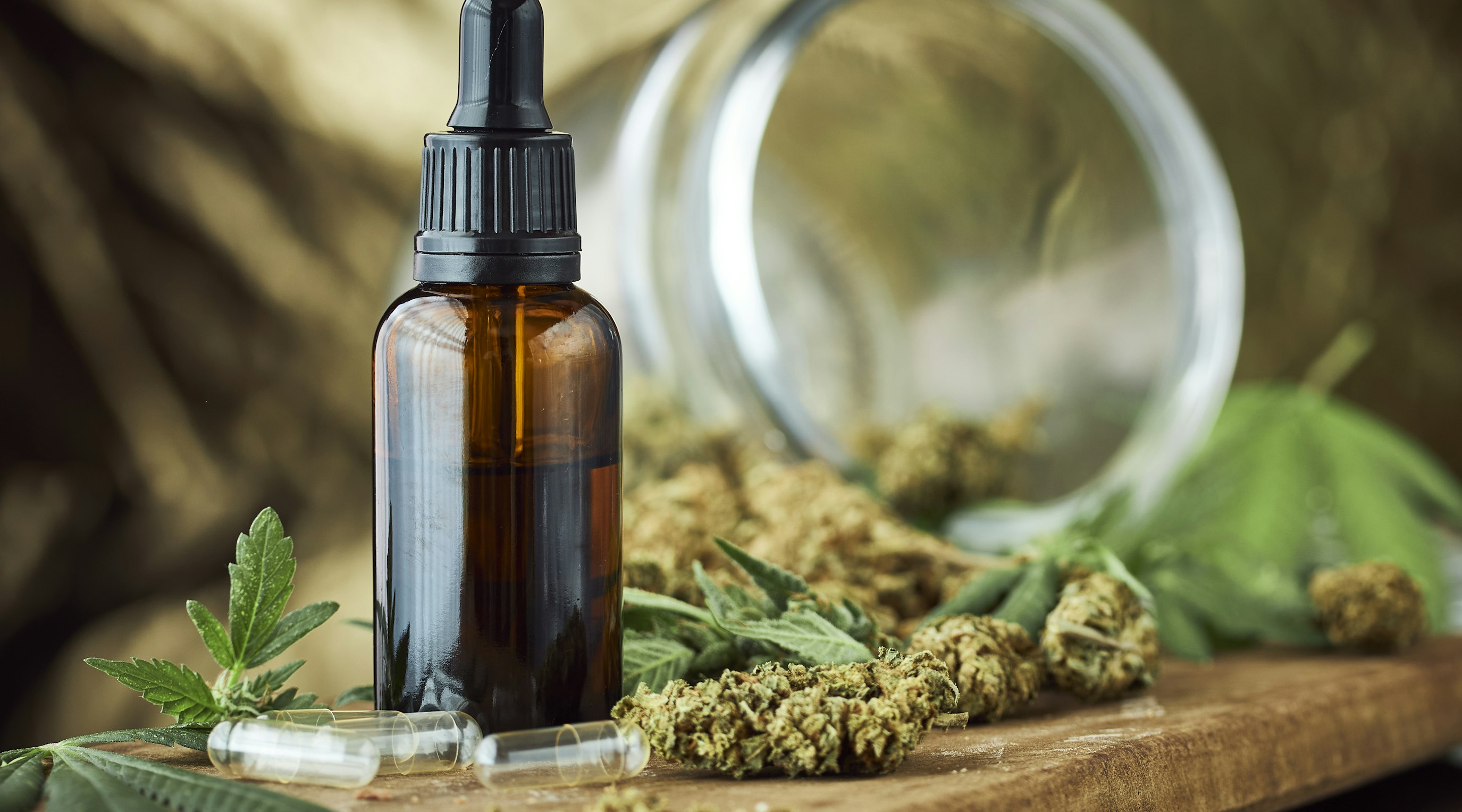THC, short for delta-9-tetrahydrocannabinol, is the main psychoactive compound derived from the cannabis plant. While recent history has linked THC to recreational consumption due to its psychoactive effects, over the past forty or so years there has been a growing interest in exploring its potential medical applications.
And thanks to the wide-reaching potential of THC through its ability to interact with the endocannabinoid system (ECS) and other pathways in the brain and body, the research into its potential medical applications has been steadily growing, with THC becoming increasingly accepted as a legitimate medicinal option.
From providing effective pain relief and controlling inflammation, to alleviating the symptoms of mental illnesses like depression and anxiety, multiple sclerosis, glaucoma, Parkinson’s disease, and a range of other illnesses and health concerns, THC is showing its potential as a powerful and versatile complementary treatment option. With ongoing research and advancements in medical science, the application of THC continues to expand, offering new possibilities for improving the lives of individuals facing various health challenges.
Given that medical cannabis is still relatively new and rapidly evolving, it is crucial for patients to have access to accurate and reliable information. This empowers patients to make informed decisions about their health and well-being, ensuring they can navigate this emerging field with confidence and clarity.
In today's write-up, let's explore what THC is, how it works, and see what the ever-growing body of clinical research is showing.
What is THC?
THC is the principal psychoactive ingredient of cannabis and is one of 113 cannabinoids (or phytocannabinoid to be more precise) that have so far been isolated from the cannabis sativa L. genus. It is also one of the primary cannabinoids produced by most cannabis cultivars, alongside CBD (cannabidiol). Other phytocannabinoids of note include CBG (cannabigerol), CBC (cannabichromene) and CBN (cannabinol).
THC is a fat-soluble molecule that binds to cannabinoid receptors in the brain and body, producing a range of psychoactive and therapeutic effects.
How does THC work?
To fully explain the mechanisms of action of THC, it helps to have an understanding of the endocannabinoid system (ECS). Only first identified in 1988, the ECS has since been shown to be a significant and influential factor in homeostasis – the body’s ability to maintain balance and optimal health. .
The ECS is made up of three components:
- The endocannabinoids, which are cannabinoids naturally produced by the body, serve as messengers within the system.
- They bind to cannabinoid receptors (CB1 and CB2) to exert their effects.
- And the metabolic enzymes that are responsible for synthesizing and breaking down endocannabinoids.
So, what does all this have to do with THC?
THC has an extraordinarily similar chemical structure to anandamide, the main endocannabinoid in our body. This means that when THC is ingested, it mimics the effects of endocannabinoids and has the ability to bind to both CB1 and CB2 receptors, which modulates the activity of our endocannabinoid receptors and can produce a range of different effects.
The mind-altering effects of THC are attributed to its strong affinity for CB1 receptor sites compared to CB2. CB1 receptors are primarily located in the brain and central nervous system, where they play a role in various physiological responses like pain relief, memory, motor control, appetite, and mood regulation. THC's activation of CB1 and CB2 receptors leads to a wide range of effects including euphoria, relaxation, altered perception, pain relief, reduced inflammation, and increased appetite.
What medical benefits does THC offer?
Before we dive into the potential therapeutic benefits that THC has been shown to offer, it is essential to point out that medical cannabis as a whole should never be viewed as a “cure-all” for any condition, or even as a replacement for traditional medications or treatments that have been prescribed by a qualified healthcare professional. It is best applied as a complementary treatment option, one that can be used to manage symptoms and promote an overall sense of wellbeing.
That being said, the potential of THC's therapeutic benefits is undeniable and a growing area of research. Here are just a few examples:
- Pain relief – This is one of the most studied areas of THC medical application, with numerous papers showing THC's ability to reduce neuropathic, chronic, and acute pain. One clinical medical review conducted on 110 patients, focusing on various back pain-related issues, revealed the effectiveness of medical cannabis in significantly reducing the reliance on opioid medications. This discovery holds immense significance, particularly in light of the ongoing opioid epidemic in the UK and US.
- Glaucoma symptom reduction – This is one of the oldest known applications for medical cannabis, with research dating back to the 70s. While it is not a cure for glaucoma, THC has been found to be effective in lowering intraocular pressure, reducing pain and inflammation associated with the condition.
- Reducing nausea and vomiting – Nausea and vomiting is a common side effect of chemotherapy, and THC has been found to have anti-emetic effects in cancer patients undergoing cancer treatment regimens.
- Reducing muscle spasticity in MS patients – Multiple sclerosis is an autoimmune condition characterized by muscle spasticity and pain, and large-scale studies have shown that THC can help reduce these symptoms.
- Sleep promotion – THC has also been found to promote healthy sleep, although this effect is dose-dependent. One study showed that the ingestion of THC led to a significant reduction in the time taken to fall asleep and increased total sleep duration for participants with insomnia.
- Anxiety and stress relief – The anxiolytic effects of THC, its ability to reduce anxiety and improve mood, are well documented. But again, this is very much dose dependent, with low doses being associated with the calming, soothing effects, while higher doses can actually produce the opposite reaction.
Does THC administration come with any risks or side effects?
THC is a potent compound and should always be taken with caution. It is important to remember that the effects of THC can vary greatly from person to person depending on a variety of factors including dose, tolerance, route of administration, and your own unique biochemistry.
With that said, when applied under the supervision and direction of a qualified healthcare professional who is registered and experienced in prescribing medical cannabis, the risks associated with THC are generally considered to be low.
The most common side effects of THC use include dry mouth, red eyes, increased heart rate, mild paranoia or anxiety in some people (although this can be managed and minimised with a low to moderate dose), and in some cases, dizziness, or drowsiness. It is also essential to remember that THC can impair judgement and coordination, and so it is illegal to drive while under the influence of THC, even if you have been legally prescribed it.
THC can also interact with other pharmaceutical medications, enhancing or diminishing their effects. It is essential to check with your healthcare provider before taking any medications in combination with THC, to ensure the safety and efficacy of both.
And as THC is intoxicating, it does come with the risk of addiction or dependence. Your prescribing doctor will always take all of these risk factors into account before making a recommendation for medical cannabis treatment.
Final thoughts
THC is proving to be an incredibly effective and versatile compound that can provide relief from a number of medical conditions. It is important to remember, however, that it should always be approached with caution, and only ever taken for medical reasons under the direction of a specialist doctor. Here in the UK, only doctors that are registered with the General Medical Council's 'Specialist Register' can prescribe medical cannabis, so it is critical to ensure that your healthcare provider is an approved specialist.
Hopefully this guide has helped to provide a better understanding of THC and its various medical applications. We believe in the power of education, and here at Releaf we aim to provide you with an informed approach to medical cannabis treatment so that you can make the best decisions for your health.
Don't let the stigma surrounding medical cannabis prevent you from getting a suitable treatment. Releaf provides tailored monthly packages, specialist consultations for medical cannabis, and a unique medical cannabis card for protection, all based on your medical cannabis prescription.





